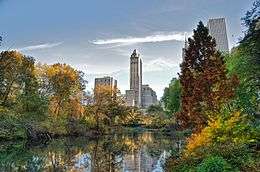Central Park Casino
The Central Park Casino, originally the Ladies' Refreshment Salon, was a restaurant in Central Park, near East 72nd Street in Manhattan, New York City. The name of the building came from the Italian for "little house"; the Casino itself was not a gambling business.[1][2]
_(17813242363).jpg)
Operation
The building was originally designed by Calvert Vaux in 1862 as part of the Greensward Plan for Central Park.[3] Initial plans called for a chalet-styled wooden structure with a low, broad hip roof.[4] Before construction began, however, Vaux decided that a more permanent building was needed. The following year, with the assistance of Edward C. Miller and Jacob Wrey Mould, the Casino was redesigned as a Gothic Revival stone structure.[5]
The building opened in early 1864 as a restaurant intended for unaccompanied female visitors to Central Park,[6] and was one of Central Park's three original restaurants.[5] Soon, it was patronized by both men and women. While the building that housed the Casino belonged to the City of New York, the City often leased the Casino to independent operators.[7] By the early 1920s, the Casino was rundown,[7] and so it was renovated during the winter of 1921–1922.[8]
Jimmy Walker, mayor of New York City during the late 1920s, frequented the Casino and reportedly spent more time there than in New York City Hall.[7] Besides entertaining elite guests in the restaurant, Walker had an office in the Casino and conducted city administration there while meeting with political cronies.[9][7] In 1929 Walker terminated the lease of C.F. Zittel and allowed a friend, Sidney Solomon, to transform the Casino into one of New York's most expensive nightclubs.[10] Plans for the renovated Casino were released in February 1929.[11] Solomon renovated the interior of the Casino using a design from Viennese designer Joseph Urban, though he kept the exterior mostly the same. The renovated Casino reopened on June 4, 1929.[12]
Demolition
When the Great Depression hit four months after the Casino reopened, the nightclub faced increasing criticism for operating on city land while maintaining prices only the wealthiest New York residents could afford. In 1930, as part of an enforcement of Prohibition, the United States government raided the Casino and seized alcoholic beverages.[13] Walker's successor Fiorello H. La Guardia and his parks commissioner Robert Moses, who held a vendetta against Walker, wanted to tear down the Casino with the intention of building a playground on the site.[14] In 1934, Moses served an eviction order to the Casino's management.[15] When the Parks Association of New York City objected to the proposed playground because it would take away from the park's rural character, Moses dismissed the opposition as "preposterous".[16][17] The Casino was ultimately demolished in 1936.[18]
Only the stained-glass windows of the Casino were preserved. They were installed in, and later removed from, the police station at the 86th Street transverse.[7] The remaining fixtures were auctioned off for pennies on the dollar.[19] The Rumsey Playfield[20] was built on the site of the former restaurant,[21][22] though it was also razed to make way for SummerStage.[7]
References
Citations
- "The Casino and Rumsey Playfield". Historical Signs Project. New York City Department of Parks & Recreation. Retrieved July 28, 2014.
- Carroll 2008, p. 40
- Kowsky 1998, p. 100.
- New York City Department of Parks and Recreation 1863, p. 37.
- Kowsky 1998, p. 159.
- New York City Department of Parks and Recreation 1864, p. 38.
- Wolf, Stephen (May 25, 2012). "Recalling Central Park's Casino and the Roaring Twenties". The New York Times. ISSN 0362-4331. Retrieved April 14, 2019.
- "The Casino Remodeled; Famous Restaurant in Central Park Saved From Decay and Beautified". The New York Times. December 25, 1921. ISSN 0362-4331. Retrieved April 22, 2019.
- Caro 1974, p. 339.
- "The Casino in Central Park". The New York Times. ISSN 0362-4331. Retrieved June 29, 2020.
- "Plans for Casino Filed; Alterations to Central Park Structure to Cost About $94,000". The New York Times. February 17, 1929. ISSN 0362-4331. Retrieved April 22, 2019.
- Rosenzweig & Blackmar 1992, pp. 398–399.
- "Park Casino and Ritz Raided for Liquor; Nine Patrons Seized". The New York Times. June 25, 1930. ISSN 0362-4331. Retrieved April 22, 2019.
- "Moses Plans to Raze Central Park Casino". The New York Times. October 22, 1935. ISSN 0362-4331. Retrieved April 22, 2019.
- "Moses Bids Casino Quit Central Park". The New York Times. May 24, 1934. ISSN 0362-4331. Retrieved April 22, 2019.
- "Moses Denounces Central Park Plea; He Holds Association's Protest Against Playground on Site of Casino Is 'Preposterous.'". The New York Times. December 25, 1935. ISSN 0362-4331. Retrieved June 29, 2020.
- Caro 1974, p. 460.
- "Moses Wins Right to Raze the Casino", The New York Times, May 2, 1936, retrieved July 28, 2014
- "Casino's Fixtures Bring Only $7,255; Equipment That Cost $400,000 in 1929 Auctioned in Central Park". The New York Times. March 17, 1936. ISSN 0362-4331. Retrieved April 22, 2019.
- "Rumsey Playfield". Central Park Conservancy. Retrieved February 24, 2016.
- Rosenzweig & Blackmar 1992, pp. 454–455.
- Caro 1974, pp. 397–398.
Sources
- Caro, Robert (1974). The Power Broker: Robert Moses and the Fall of New York. New York: Knopf. ISBN 978-0-394-48076-3. OCLC 834874.CS1 maint: ref=harv (link)
- Carroll, Raymond (May 1, 2008). The Complete Illustrated Map and Guidebook to Central Park. New York: Sterling Publishing Company, Inc.CS1 maint: ref=harv (link)
- Rosenzweig, Roy & Blackmar, Elizabeth (1992). The Park and the People: A History of Central Park. Cornell University Press. ISBN 0-8014-9751-5.CS1 maint: ref=harv (link)
- "1863 Central Park Commissioners Annual Report" (PDF). New York City Department of Parks and Recreation. 1863.
- "1864 Central Park Commissioners Annual Report" (PDF). New York City Department of Parks and Recreation. 1864.
- Kowsky, Francis R. (1998). Country, Park, & City: The Architecture and Life of Calvert Vaux. Oxford University Press. ISBN 978-0-19-511495-9.
External links
| Wikimedia Commons has media related to Casino in Central Park. |


.jpg)